For listeners who may never have attended a symphony orchestra concert, there are numerous entry points by which you can satisfy your curiosity without feeling intimidated or making a large cash investment. Here I offer some suggestions that should smooth your way and maximize your pleasure in the experience.
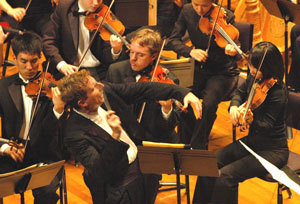 Almost every city will probably have its own professional symphony orchestra. These range in scope from the big international models like the New York Philharmonic Orchestra and Boston Symphony, to the regional and community based orchestras, which are also excellent and certainly worth hearing. What's more, your nearby colleges may well have student orchestras, which can rival professional ensembles in brilliance, particularly when affiliated with a fine music conservatory.
Almost every city will probably have its own professional symphony orchestra. These range in scope from the big international models like the New York Philharmonic Orchestra and Boston Symphony, to the regional and community based orchestras, which are also excellent and certainly worth hearing. What's more, your nearby colleges may well have student orchestras, which can rival professional ensembles in brilliance, particularly when affiliated with a fine music conservatory.
Professional orchestras typically divide their seasons into segments based upon very different types of musical offerings. There is the main subscription series which will feature serious classical programs headed up by the Music Director, a Pops series featuring guest stars, a short series of presentations with celebrities such as Joshua Bell or Yo Yo Ma playing for one night only, and the summer park concerts. Each of these types of concerts offers some great live experiences and a rich choice of options.
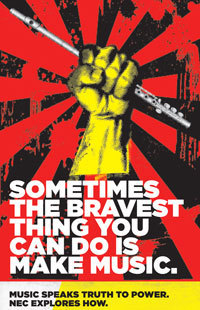 College or conservatory orchestras generally present a short series of concerts scheduled during the school year, conducted either by a resident music director or visiting guests. These concerts are sometimes linked to a season-long theme or festival topic that can prove quite enlightening. For example, this year, New England Conservatory is presenting a year-long festival Music: Truth to Power in which the programming demonstrates how music has been an expression or catalyst of human struggle throughout the ages.
College or conservatory orchestras generally present a short series of concerts scheduled during the school year, conducted either by a resident music director or visiting guests. These concerts are sometimes linked to a season-long theme or festival topic that can prove quite enlightening. For example, this year, New England Conservatory is presenting a year-long festival Music: Truth to Power in which the programming demonstrates how music has been an expression or catalyst of human struggle throughout the ages.
But before we get down to concert choice, let's begin with money. Ticket pricing and availability for most orchestras are very flexible. You should look out for special deals and discounts which are made available on a pretty frequent basis online or in the press. In the case of college or conservatory orchestras, concerts are likely to be free or very attractively priced.
At this stage in your concert going there is no need to sign up for a whole series of subscription concerts. It is largely a buyers' market and you can experiment at fairly low prices. I should also mention that park concerts are traditionally free, but you will need to bring your own seating! More on that one later.
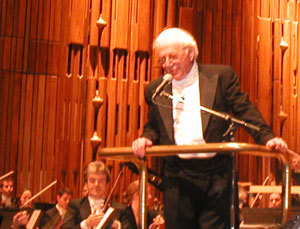 Let's start with the classical subscription Series. For me, the "specialty" concerts by an orchestra's Music Director are the ones to go for. The Music Director is always identified as such on orchestras' marketing materials and in many cities he or she is something of a celebrity in the local culture. These concerts and programs are the ones that are more carefully prepared and often represent the season's best offerings. If available, choose a night when the Music Director speaks to the audience. This is always fun and provides some great insights about the music. You don't need to know anything about the music being performed or whether the composer is Russian or Chinese or American. But if you are curious, think about attending a pre-concert talk which will be about the music you will be hearing that night. These can be really valuable. But, again, not essential.
Let's start with the classical subscription Series. For me, the "specialty" concerts by an orchestra's Music Director are the ones to go for. The Music Director is always identified as such on orchestras' marketing materials and in many cities he or she is something of a celebrity in the local culture. These concerts and programs are the ones that are more carefully prepared and often represent the season's best offerings. If available, choose a night when the Music Director speaks to the audience. This is always fun and provides some great insights about the music. You don't need to know anything about the music being performed or whether the composer is Russian or Chinese or American. But if you are curious, think about attending a pre-concert talk which will be about the music you will be hearing that night. These can be really valuable. But, again, not essential.
In addition to pre-concert talks, both professional and college orchestras may feature detailed descriptions of their concerts on their websites and sometimes stream informative podcasts as well.
What is essential is to allow yourself the opportunity of a really strong visceral experience and response to the musicians and the sheer sound of their music. You should ask the box office to recommend seats with the best acoustics and sight lines to allow just that. The box office will have lots of opinions and recommendations about the hall and will enjoy being asked. It's a bit like the waiter going through the specials of the day!!
As for what to wear: there is no need to buy a new suit, or dress up in any way. This is not an expectation. You can turn up in jeans and a T-shirt and everyone will be pleased to see you.
Now... there is that whole strange ritual of applause and when you should applaud. This subject 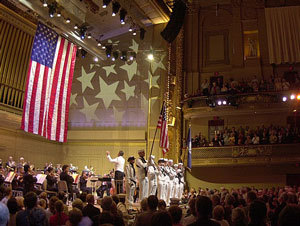 always reminds me a bit of sitting down to fancy dinner and finding all those hundreds of different knives and forks in front of you. What to do? Will I be embarrassed? Found out? About tableware, my father always told me to work from the outside in, even if your intuition said this just can't happen. Well, applauding is a bit like that. If you're feeling uncertain, just watch your neighbor, and follow his lead. But if, at the end, you feel that this performance has been great and has changed your life forever, then shout and scream. There is nothing quite like an audience on its feet yelling approval of a great performance.
always reminds me a bit of sitting down to fancy dinner and finding all those hundreds of different knives and forks in front of you. What to do? Will I be embarrassed? Found out? About tableware, my father always told me to work from the outside in, even if your intuition said this just can't happen. Well, applauding is a bit like that. If you're feeling uncertain, just watch your neighbor, and follow his lead. But if, at the end, you feel that this performance has been great and has changed your life forever, then shout and scream. There is nothing quite like an audience on its feet yelling approval of a great performance.
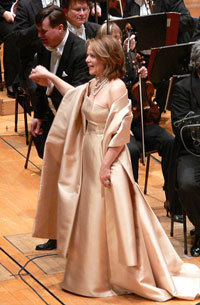 Then there is the Pops series. This is very different to the Classical Series. The Music Director very seldom conducts and instead there will be a Pops Conductor or a special guest. These concerts are often themed to feature celebrity Pops artists such as Jason Alexander, Warren Haynes, Bill Porter, Melissa Etheridge, and Jennifer Holliday. They are a fun way of getting to know your orchestra and the hall.
Then there is the Pops series. This is very different to the Classical Series. The Music Director very seldom conducts and instead there will be a Pops Conductor or a special guest. These concerts are often themed to feature celebrity Pops artists such as Jason Alexander, Warren Haynes, Bill Porter, Melissa Etheridge, and Jennifer Holliday. They are a fun way of getting to know your orchestra and the hall.
Similarly, one-night Presentation concerts spotlight touring classical stars like violinist Itzhak Perlman, the astonishing Chinese pianist Lang Lang, or a singer such as the beautiful soprano Renée Fleming, usually performing some of their greatest concerto or aria hits. Although the emphasis is on the celebrities rather than the orchestra and its musicians, these concerts are a way of seeing some really great artists.
Park Concerts are some of my favorite events of all time. They are planned for the height of the summer with a destination park in mind, so the setting can be sensational. The orchestra is often 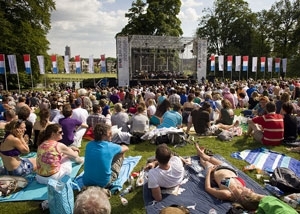
Your local orchestra, whether professional or college, is a great resource and really worth getting to know better. I invite you to experiment this year. The financial outlay should be fairly minimal or free, but you will experience something extraordinary, something that will add much joy and pleasure to your life.